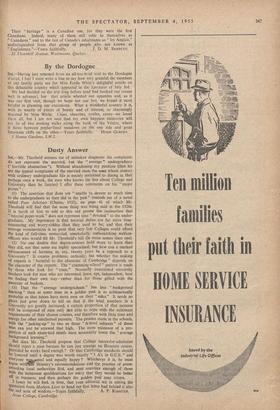Dusty Answer
SIR,—Mr. Theobald accuses me of mistaken diagnosis: his complaints do not represent the married, but the " average " undergraduate
horfible abstraction "). Without abandoning my position (that his are the typical complaints of the married man, the man whose contact with ordinary undergraduate life is mainly restricted to dining in Hall perhaps once a week, the man who knows far less about College and University than he fancies) I offer these comments on his " major points" :
(1) The assertion that dons are "unable to devote as much time to the undergraduate as they did in the 'past" reminds me of a novel called Poor Scholars (Chatto, 1932), on page 41 of which Mr. Theobald will find that the same thing was being said in the 1920s. It is harsh of him to add to this old grouse the insinuation that " tutorial paper-work " does not represent time " devoted " to the under- graduate. My impression is that tutorial duties are far more time- consuming and worry-ridden than they used to be; and that their average remuneration is so poor that very few Colleges could afford the kind of full-time, unmarried, unscholarly, unresearching welfare- officers who would fill Mr. Theobald's bill (In more senses than one).
(2) No one doubts that degree-courses hold more to learn than they did, nor that some are highly specialised; but how can a marked advancement of learning in, say, twenty years be a reproach to a University ? It creates problems, certainly; but whether the making of experts is " harmful to the character of Cambridge " depends on the character of the experts. The " cramming-school " pattern is made by those who look for " cram." Normally constituted university teachers look for men who are interested, keen, apt, independent, bent on finding their own way—rather than for those gifted with the passivity of buckets. (3) That the " average undergraduate" has less " background learning " than at some time in a golden past is as arithmetically Probable as that tutors have more men on their " sides." It needs no ghost just gone down to tell us that if the total numbers in a University are greatly increased, a certain proportion of that increase will be .composed of men only jest able to cope with the minimum requirements of their chosen courses, and therefore with little time and energy for other intellectual pursuits. The process starts in the schools, with the " jacking-up" to two or three " A-level subjects " of those Who can just be screwed that high. The mere existence of a pro- Portion of such exam-tied minds must necessarily lower the " average background learning."
But does Mr. Theobald propose that College tutors-for-admission should reject a man because he can just manage an Honours course, provided he works hard enough ? Or that Cambridge standards should be lowered until a degree was worth exactly " 3 A's in G.C.E." and everyone woqual and equally happy ? Whichever it is, he must
argue with Ministry's recommendations and the practice of grant- awarding local authorities first, and next convince enough of those With the 'minimum qualifications for entry that they would be better off in business; and then perhaps the golden past may return. I fancy he will find, in time, that your editorial wit in setting the quotation from Modern Love to head my first letter had behind it also


































 Previous page
Previous page